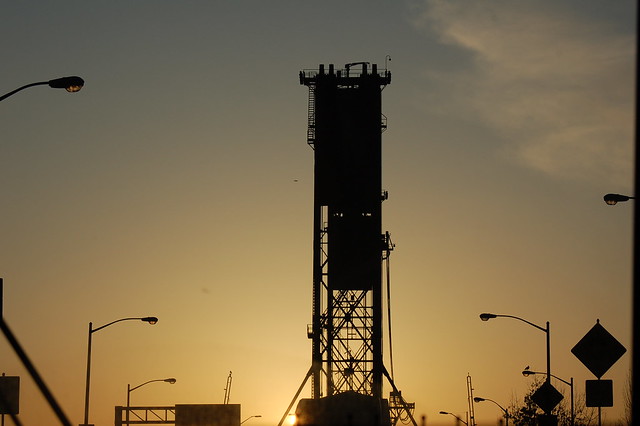
February 20, 2009, the sun provided a golden background for the Hawthorne Bridge towers. There really are two towers here--the large rectangles you see are the counterweights which, when lowered, raise the center section to the bridge. The higher one was closer to me when I took this photo. The Hawthorne Bridge is special to me for several reasons--it's the first bridge I road a bus over, in June, 2004, when we first visited my sons here; it's the first bridge I walked over, in January, 2007, through a thick snowstorm; it's the bridge I cross most often.
Here's what I found at Wikipedia: The Hawthorne Bridge is a truss bridge with a vertical lift that spans the Willamette River in Portland, Oregon, joining Hawthorne Boulevard and Madison Street. It is the oldest vertical-lift bridge in operation in the United States and the oldest highway bridge in Portland. It is also the busiest bicycle and transit bridge in Oregon, with over 4,800 cyclists and 800 TriMet buses (carrying about 17,400 riders) daily.
Size
The bridge consists of five fixed spans and one 244 ft (74 m) long vertical-lift span. It is 1,382 feet (421 m) in total length. The 880,000 pound (400,000 kg) counterweights are suspended from the two 165 ft (50 m) tall towers. While the river is at low level the bridge is 49 feet (15 m) above the water, causing it to be raised an average of 200 times per month. As of 2001, the average daily traffic was 30,500 vehicles. The bridge was designed by John Waddell, inventor of the vertical-lift bridge and also designer of the Steel and Interstate bridges.
History
The current bridge was built to replace Madison Bridge No. 1 (1891) and Madison Bridge No. 2 (1900), which was destroyed by a fire in 1902. It cost $511,000 to build and was opened on December 19, 1910. Hawthorne Boulevard (and thus the bridge) was named after Dr. J.C. Hawthorne, the cofounder of Oregon's first mental hospital and early proponent for the first Morrison Bridge.
The deck was changed from wood to steel grating in 1945. In 1985 the lift span sheaves, the grooved wheels that guide the counterweight cables, were replaced. The bridge went through a $22 million restoration from 1998–99, which included replacing the steel grated deck and repainting. The original lead-based paint was completely removed and replaced with 3 layers of new paint that is estimated to last 30 years. During this upgrade the sidewalks were widened to 10 feet (3 m), making it a thoroughfare for bicycle commuters. Due to the replacement of the steel deck during this project, the channels which used to carry the rails for streetcars and interurban trains were also removed. In 2001 the sidewalks were connected to the Eastbank Esplanade. The estimated cost to replace the bridge is $189.3 million.
The original color of the bridge was black, lasting until 1964, when it was repainted yellow ochre.[7] During the 1998-99 renovation, the color was changed to green with red trim.
The 2003 film, The Hunted, included a scene set on MAX on the Hawthorne Bridge. Since MAX does not cross the bridge, the movie company connected two articulated buses remodeled to resemble a MAX train, complete with fake overhead lines and a sprinkler system to simulate rain. Light-rail (interurban) service did cross the Hawthorne Bridge until 1956. The new deck put in place in the outer lanes during the 1998–99 renovation was designed to be strong enough for possible use by modern, heavier streetcars or light rail trains in the future, which was proposed at that time, and TriMet was still considering a Hawthorne Bridge routing for its future MAX Orange Line, to Milwaukie, in 2002. However, following the transit agency's later decision to build a new bridge for the Milwaukie MAX line, which bridge could also be used by the Portland Streetcar, it became unlikely that rail cars will ever again cross the Hawthorne Bridge.
Carries vehicles, pedestrians, cyclists
Crosses Willamette River
Locale Portland, Oregon
Maintained by Multnomah County
Design truss with a vertical-lift span
Total length 1,382 ft (421 m)
Width 72 ft (22 m)
Longest span 244 ft (74 m)
Clearance below 49 ft (15 m) closed, 159 ft (48 m) open
Opened December 19, 1910
No comments:
Post a Comment